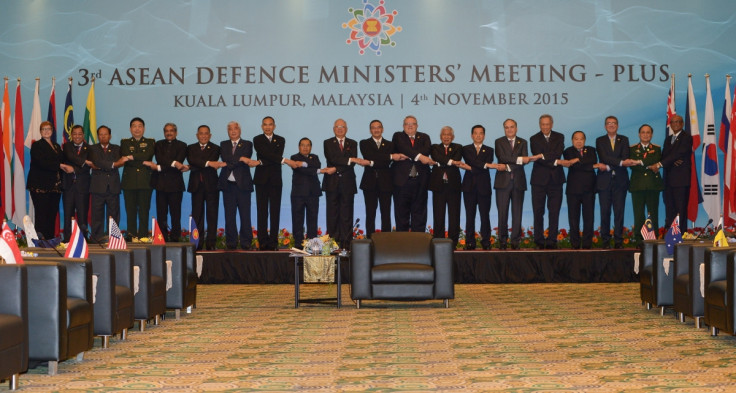South China Sea territorial dispute takes over Asean summit as US and China flex their muscle

The customary joint declaration by the 10-nation Asian countries was abandoned after the defence ministers from the countries could not reach a consensus on a growing issue plaquing the region - the South China Sea territorial dispute. It is customary for the Association of South Asian Nations to issue a joint declaration after a high level ministerial meeting.
Although no reason was issued for dropping the signing of the Kuala Lumpur Joint Declaration from the host Malaysia, both the US and China officials have been pointing fingers at each other. The Asean Defence Ministers Meeting held in the outskirts of Kuala Lumpur was followed by another meeting with their defence counterparts from eight dialogue partners: Australia, China, India, Japan, New Zealand, South Korea, Russia and the US.
Malaysia's Defence Minister Hishammuddin Hussein said that a consensus could not be reached among the participating nations. He did not elaborate. He however did say that there were other avenues to address issues of contention without mentioning what the issues were.
Earlier, a senior US defence official said China was lobbying the Asean nations to drop any reference to South China Sea in the joint declaration. "Understandably a number of Asean countries felt that was inappropriate. It reflects the divide China's reclamation and militarisation in the South China Sea has caused in the region," the official who declined to be identified said.
The US official added: "This was an Asean decision but in our view, no statement is better than one that avoids the important issue of China's reclamation and militarisation in the South China Sea. The outcome of the meeting however is not a good omen as both China and the US have been flexing their military presence in the region over the past few weeks.
Only last week, US warship the USS Lassen challenged the territorial waters around one of China's man-made islands in the Spratly archipelago with a so-called freedom-of-navigation patrol. China is now undertaking training of its jets with missiles in the area in response.
China claims most of the South China Sea and has been building man-made islands, to the horror of its neighbours who are also claiming rights to the territory. Vietnam, Malaysia, Brunei, the Philippines and Taiwan have all made sovereign clams. The disputed territory is a major commercial route with more than $5tn in global trade passing through every year.
China however had made it clear right from the start that the South China Sea issue was off the table, both for discussion and for inclusion in the joint declaration. China believes that the issue would be better served discussed at a different level and arena, which many observers note, is a clever move to take advantage of the existing differences within the Asean member states on the issue
It was however believed that host Malaysia had initially agreed to include a mention of the South China Sea in the joint statement. A Philippines official, who declined to give details, said his country, which had been pushing for a stronger stance against China on the issue, was happy with the initial proposal.
A copy of remarks by Malaysia's Hishamuddin was issued to the media by mistake and was later retracted. In the remarks, he said that Asean seeks a "peaceful resolution to the disputes" in the South China Sea. "Collisions in open seas and skies must be avoided at all costs," the statement said, adding that leaders should prioritise regional security.
The clear absence of a joint declaration is a surprise as past Asean communiques have made extensive references to the South China Sea issue. In fact, in 2013, the Asean foreign ministers who had convened in Brunei had issued a statement referring to the importance of "peace, stability, and maritime security in the region" and the resolution of any disputes "by peaceful means in accordance with universally recognised principles of international law."
Meeting between US and China
In a 40 minute meeting between US Defence Secretary Ash Carter and his Chinese counterpart Chang Wanquan, the two discussed the territorial dispute, a senior US defence official confirmed. A strongly worded Chinese defence ministry statement issued after the meeting said: "The Chinese people and military will not stand for any infringements of China's sovereignty and relevant interests. We urge the United States to put a stop to all its mistaken words and deeds and not take any other dangerous moves which threat China's sovereignty and security interests."
© Copyright IBTimes 2025. All rights reserved.






















